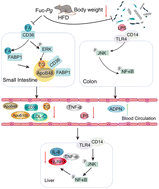Background: Fucoidans extracted from sea cucumber Pearsonothuria graeffei (fuc-Pg) are rich in 4-O-sulfation, and have been shown to be potential functional polysaccharides for preventing metabolic syndromes. Objective: The present study was conducted to investigate the effect of fuc-Pg on the prevention of obesity and its underlying mechanism. Method: Mice were fed a normal diet, high-fat diet (HFD), HFD plus low and high dosage of fuc-Pg, and HFD plus simvastatin for 8 weeks. Results: fuc-Pg intervention could significantly decrease weight gain and fat accumulation in the HFD-fed mice. Moreover, fuc-Pg improved serum lipid profile by decreasing serum concentrations of TG, TC, LDL-C, sCD36, ApoB48, and ApoB100 compared with the HFD group. HFD-induced upregulation of intestinal CD36, FABP-1, P-ERK1, and the ratio of p-ERK/ERK was reversed by the fuc-Pg treatment. Moreover, fuc-Pg improved the normal function of white adipose tissue by increasing the expression of UCP1, PPAR-γ, and PGC-1α in the HFD-fed mice. Furthermore, fuc-Pg alleviated systemic inflammation by reducing serum pro-inflammatory factors and breaking the TLR4/NF-κB pathway in both the colon and liver. Conclusion: Fuc-Pg is a potential functional polysaccharide for preventing obesity and systemic inflammation caused by HFD.

